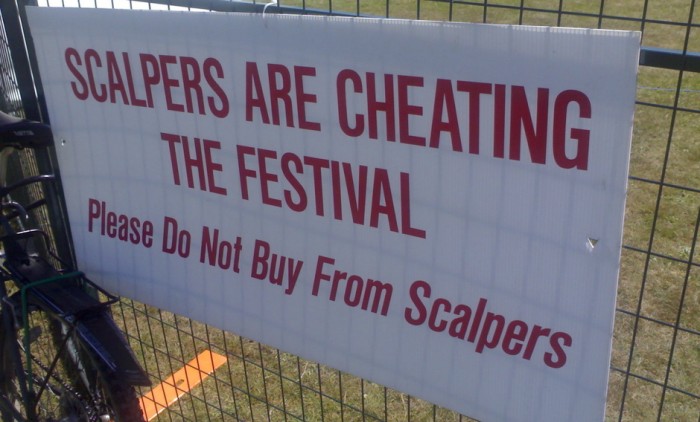This week MPs voted to reject an amendment to the Consumer Rights Bill aiming to reform the secondary ticket market, where event tickets are sold for profit. This seemed to surprise some people who, up until this point, had assumed that ticket touting was illegal. Indeed, for many years I thought as much myself.
Partly this was down to my first exposure to touts, way back when I was a football-loving nipper. Strolling up Avenell Road with my dad on the way to the Arsenal Stadium meant passing dozens of shifty-looking men furtively muttering “anyone need tickets?” Initially I didn’t understand why they were being so coy about the wares they had to sell. The guy who flogged nuts outside the North Bank certainly didn’t seem so shy, judging by his roaring, guttural cry of something vaguely resembling the word “peanuts” if you removed all the consonants. It was only when my dad explained that reselling match tickets was illegal that I realised why the touts were so quiet.
Later, when I started supplementing football matches with gig attendance, I noticed a different type of tout. On the surface they looked the same; the same dodgy manner, the same sheepskin jackets, the same way of speaking without looking directly at anyone, as if they were talking to ghosts that only they could see (ghosts that apparently needed tickets for Supergrass). In all probability a few of them were the same actual people, moonlighting at a different type of event. But in contrast to the football touts, they were far more open about their activities, advertising themselves outside tube stations with a loud mantra of “buy and sell tickets,” repeated ad infinitum.
This confused me a little, but to be honest I didn’t think about it much. After all, there were plenty of drug dealers outside Camden Town station who were similarly unsubtle about their operations. Plus, I’d never seen any football touts actually being arrested for their crime, so thought perhaps it was just something the police turned a blind eye to. It was only years later that someone told me that touting was actually only illegal for football matches.
The reason for this dates back to the bad old days of rampant football hooliganism. When the Criminal Justice and Public Order Act 1994 was introduced, the English game was still struggling to shrug off an unsavoury reputation following incidents like the Heysel Stadium disaster; indeed, at that year’s World Cup the competition’s committee chairman Alan Rothenberg stated, “There were three countries in the world whose presence would have created logistical problems. So we’re very pleased they won’t be coming – Iraq, Iran and England.”
The formation of the Premier League two years earlier, funded by a lucrative television deal, also necessitated the successful re-branding of football as safe, family-friendly entertainment. The criminalising of touting meant that clubs had far greater control over who tickets were being sold to, in theory helping prevent opposition fans from getting seats in the wrong part of the ground, or known hooligans from getting in at all.
That considered, why should we complain that the law is different for music events? There’s no comparable hooliganism problem associated with live music and, the odd hilarious incident at One Direction gigs aside, scenes of violence are relatively uncommon at gigs. In fact, you could argue that the law is already overzealous when it comes to concerts, from the use of Form 696 to cancel gigs based on the ethnicity of those likely to attend, to stringent security and ID checks. Yet while ticket touting might not be helping facilitate unruly behaviour at gigs, it is committing a violent act towards punters’ pockets.
Labour’s Sharon Hodgson and Conservative Mike Weatherley have been at the forefront of the campaign to push through amendments to the Consumer Rights Bill that would combat touting. When Hodgson first brought the issue to the Select Committee on Culture, Media and Sport in 2011, she used the example of a Brandon Flowers gig that had sold out straight away, only for a quarter of the 2,300 tickets to turn up on secondary websites “within minutes,” for more than three times the face value. That this is possible is almost certainly down to the practice of unscrupulous box office managers selling premium tickets to touts before they’re even on general sale. While I’d personally pay to avoid seeing Brandon Flowers prance about in his feathery jacket, it’s not hard to see why fans would’ve been fuming.
The bitter fury caused by large scale touting remains a familiar occurrence. Consider PJ Harvey’s recently announced live recording sessions at Somerset House. Tickets sold out straight away (with the seller’s site crashing due to the volume of traffic), much to the anguish of many fans, including myself. A few days later, the disappointment having not worn off, I checked to see if anyone had started selling spares online. Only one ticket had appeared elsewhere, on Viagogo, for almost £300. The original price, in case you were wondering, was £15.
Of course, some people see this as simply taking advantage of a discrepancy between supply and demand, totally acceptable behaviour in a free market economy. One such person is the Conservative MP Sajid Javid. This was his take on the issue during a Select Committee on Culture, Media and Sport debate back in 2011:
“Ticket resellers act like classic entrepreneurs, because they fill a gap in the market that they have identified. They provide a service that can help people who did not obtain a supply of tickets in the original sale to purchase them for sporting and cultural events. As long as those tickets have been acquired genuinely and lawfully, it is an honest transaction, and there should be no Government restriction on someone’s ability to sell them.”
He went on to reference his own experience of witnessing tickets to see his local team Bristol City being sold “at prices that were multiples of the face value,” insisting that though the sellers “may have seemed unsavoury to some people,” they were essentially “ordinary hard-working people providing a service in a legitimate way.” While acknowledging Labour MP Ian Austin’s amusing dismissal that anyone has ever paid multiples of face value for a Bristol City ticket as “ludicrous fantasy,” Javid’s argument makes total sense from his ideological standpoint, namely that the government has no place interfering in the free market. I don’t agree with him, but then I wouldn’t necessarily expect to on an issue like this.
The problem is that Javid is currently Secretary of State for Culture, Media and Sport, and as such his role is supposedly to promote and support the culture industry. Endorsing a practice whereby middle-men can potentially cream a bigger wedge of cash from the event than the performers, promoters or venues would be an odd way to do so, which is perhaps why Javid has been a little quieter on the subject of late. In contrast, many people in the culture industry have been extremely vocal about it, with a recent open letter on the subject being signed by everyone from One Direction and Olly Murs’ management to the Lawn Tennis Association, alongside the organisers of pretty much every small festival you’ve ever heard of.
The Royal Opera House have also complained about the situation, with a spokesman telling the Huffington Post in April how subsidies aimed at making opera more accessible are ironically resulting in tickets being sold at prices only the elite can afford:
“We receive a grant from the Arts Council to help make the Roya Opera House accessible to all. Over 40% of our seats prices are less than £40. A tout who buys cheap seats for highly desirable productions and then sells them at a vast profit undermines the whole point of subsidy, and it is the public who lose out. By selling these tickets at inflated prices, it denies access to those who the tickets are aimed at.”
Affordable access to culture is part of Javid’s remit, yet his deafening silence on the issue since assuming his new position suggests he’s having trouble reconciling this with the free market dogma he subscribes to. Secondary ticket companies themselves obviously don’t have the same social responsibilities; indeed, if legislation was to eventually be passed then it would make it extremely hard for many of them to continue operating in this country.
Which is probably why the likes of Viagogo, partly backed by Lord Jacob Rothschild, are more bullish in the face of the controversy. Their argument tends to focus on how changing the current system would restrict the ability of consumers to recoup their money if they find themselves unable to attend an event. Here, for instance, is Viagogo’s Ed Parkinson responding to a 2011 High Court ruling brought about by the Rugby Football Union, which required them to identify sellers’ identities on their website:
“It is regrettable that while millions of fans use Viagogo’s service … the RFU remains intent on preventing them from recouping money from tickets they can no longer use. Their views on the rights of consumers to control their own property and protect their own information are outdated … Fans can rest assured that Viagogo is committed to vigorously defending both their rights and their information.”
Hail Viagogo, righteous defenders of the people! Even after they lost a Supreme Court appeal in 2012, Parkinson still boasted that publicity from the case had actually led to it becoming “the largest rugby ticket market place on the planet.” His confidence in the face of a potentially precedent-setting ruling may have been down to the fact that earlier in the year the company had quietly changed its official name to Consolidated Information Services Ltd and put itself into liquidation, transferring everything to a new company based in Switzerland, Viagogo AG, thus rendering itself exempt from UK law. You can only imagine how much that wound up the RFU, frustration no doubt compounded when a ticket officially allocated to England fly-half Owen Farrell for a match against Wales last March ended up being sold via Viagogo for more than five times its face value.
That hardly sounds like the actions of the poor punter Parkinson would have you believe is Viagogo’s average user, simply trying to avoid being left out of pocket because they can’t make an event. Indeed, the company was rather less eager to comment when a 2012 Dispatches documentary team asked them to respond to evidence of Viagogo staff buying up primary tickets using multiple credit cards to then sell on the site, and having a special team to assist the large scale touts who account for a significant percentage of sales on their exchange. Instead, the company tried to take out an injunction to prevent the documentary being screened. They failed, and the doc is now available to view on YouTube:
However, even if that is your position, it seems bizarre that the government would offer grants and subsidies to encourage art creation and cultural engagement while rejecting a proposal that would allow more democratic access to cultural events, and ensure a greater proportion of ticket sales goes towards the people actually involved in putting on the events.
This isn’t to say that re-selling tickets should be criminalised, which is the sort of scaremongering languageJavid has been using recently, nor is that what the amendment even proposed. Instead the idea was that resellers would no longer be granted anonymity, would have to specify where the seats they were selling actually were, and would be required to reproduce the terms and conditions of the ticket in full in order to ascertain whether it was actually allowed to be resold. Many tickets actually aren’t – not that anyone seems to take a blind bit of notice – but if legislation is introduced then it’s possible ticketing companies would remove that stipulation anyway. After all, they may gain no extra cash from a ticket exchange after the original sale, but nor do they lose any, and none of them want their events to be emptier than they could be. Another suggestion has been to introduce a cap on ticket resale prices of 10% more than the face value.
None of these things would seem, to me, to dissuade anyone genuinely trying to sell on a ticket that’s no longer needed. I’ve personally resold tickets at face value several times via Facebook, Last.FM and Gumtree, and would have no problem adhering to the suggested amendments if I needed to do so in future.
In which case, what’s the point of secondary ticket sites at all? Well, in Viagogo’s defence, they do offer consumers a full refund if the ticket isn’t delivered; a significant reassurance when plenty of secondary ticket companies offer tickets for sale that they haven’t even yet acquired themselves. I was stung in such fashion myself a decade ago, when a company I’d bought a Glastonbury ticket through went bust a week before the festival, and turned out to have never at any point actually possessed the tickets in question. Sadly I had no legal recourse (although I did manage to secure a last minute replacement ticket from a genuine punter on Gumtree), so I’ll give Viagogo their due here, even if the argument that their guarantee means there’s no need to provide seller transparency doesn’t necessarily hold water.
You won’t find Glastonbury tickets on Gumtree or Viagogo these days, the festival having long since moved to a registration system in order to cut out touting (indeed, Viagogo tried to capitalise on the controversy of Metallica headlining last year’s event by claiming that 4 out of 5 ticket-holders wanted to sell their tickets but were unable to). Still, that approach is an expensive process way beyond the reach of many events organisers. And why should they have to go through it when a simple change in the law would suffice? Aside from the ones selling tickets to touts under the table, you’ll be hard-pushed to find a promoter in favour of illegitimate ticket re-selling, and these are the people working hard to put on gigs in the first place.
Talking of hard-working people, let’s go back to Sajid Javid’s description of touts as exactly that. Now, back in the day there’s no doubt that description was deserved. After all, before the internet, touts not only had to buy the tickets in person but also sell them in the flesh too. Nowadays they’re now able to do it all from their homes using botnets and secondary websites, part of the reason why the secondary ticket market is now worth a reported £1 billion a year (organised criminal networks are estimated to earn £40 million a year from it alone). According to Action Fraud, the number of people complaining about online ticket fraud increased from 600 in 2010 to 3,000 in 2012, a number that in reality is probably far greater.
Without new legislation that figure is only going to increase, even taking into account a 2013 police report that indicated ticket fraud is significantly under-reported. The same report concluded that “due to the surreptitious way that large numbers of ‘primary’ tickets are diverted straight onto secondary ticket websites, members of the public have little choice but to try to source tickets on the secondary ticket market,” and that “the lack of legislation outlawing the unauthorised resale of tickets and the absence of regulation of the primary and secondary ticket market encourages unscrupulous practices, a lack of transparency and fraud.” Put simply, it’s a fix – and the government apparently have no appetite to remedy it.
Both musicians and their fans want ticket reform. So do promoters, venues, and the police. Let’s hope that the Culture Secretary sides with them next time the Consumer Rights Bill amendment comes around, rather than dodgy secondary ticket companies that contribute precisely nothing to culture in the UK. Free market fanatics may protest, but is a system where a sizeable amount of event tickets are sold under the table to anonymous touts before they’re available to the general public really a free market? Of course it isn’t. Now that the bill is back with the House of Lords, do consider writing to a Lord directly and asking them to support the fight against fraudulent ticket re-selling. Until then, follow the lead that CHVRCHES have taken (never thought I’d write that) and #leaveoutthetout.
P.S. If anyone has tickets to that PJ Harvey residency, do get in touch. I’ll happily pay 10% over face value. As long as it’s not via Viagogo.
Kier Wiater Carnihan






Follow us
Follow us on Facebook Follow us on Twitter Follow us on Google+ Subscribe our newsletter Add us to your feeds